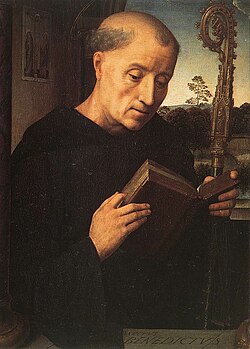Saint Benedict Quote
If any pilgrim monk come from distant parts with wish as a guest to dwell in the monastery and will be content with the customs which he finds in the place and does not perchance by his lavishness disturb the monastery but is simply content with what he finds he shall be received for as long as he desires. If indeed he find fault with anything or expose it reasonably and with the humility of charity the Abbott shall discuss it prudently lest perchance God had sent him for this very thing. But if he have been found gossipy and contumacious in the time of his sojourn as guest not only ought he not be joined to the body of the monastery but also it shall be said to him honestly that he must depart. If he does not go let two stout monks in the name of God explain the matter to him.
If any pilgrim monk come from distant parts with wish as a guest to dwell in the monastery and will be content with the customs which he finds in the place and does not perchance by his lavishness disturb the monastery but is simply content with what he finds he shall be received for as long as he desires. If indeed he find fault with anything or expose it reasonably and with the humility of charity the Abbott shall discuss it prudently lest perchance God had sent him for this very thing. But if he have been found gossipy and contumacious in the time of his sojourn as guest not only ought he not be joined to the body of the monastery but also it shall be said to him honestly that he must depart. If he does not go let two stout monks in the name of God explain the matter to him.
Related Quotes
About Saint Benedict
Benedict founded twelve communities for monks at Subiaco in present-day Lazio, Italy (about 65 kilometres (40 mi) to the east of Rome), before moving southeast to Monte Cassino in the mountains of central Italy. The present-day Order of Saint Benedict emerged later and, moreover, is not an "order" as the term is commonly understood, but a confederation of autonomous congregations.
Benedict's main achievement, his Rule of Saint Benedict, contains a set of rules for his monks to follow. Heavily influenced by the writings of John Cassian (c. 360 – c. 435), it shows strong affinity with the earlier Rule of the Master, but it also has a unique spirit of balance, moderation and reasonableness (ἐπιείκεια, epieíkeia), which persuaded most Christian religious communities founded throughout the Middle Ages to adopt it. As a result, Benedict's Rule became one of the most influential religious rules in Western Christendom. For this reason, Giuseppe Carletti regarded Benedict as the founder of Western Christian monasticism.
